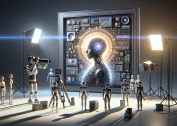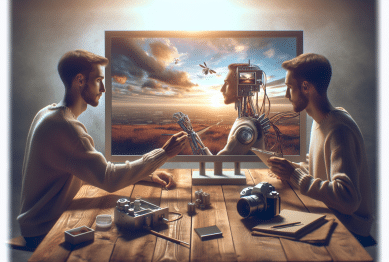In today’s fast-paced world, creativity is often seen as the key to personal and professional success. Yet, many people overlook a powerful tool that can significantly boost creative thinking: reflection. Reflection, the intentional process of reviewing experiences, thoughts, and emotions, plays a critical role in enhancing creativity. This article explores how reflection enhances creativity, supported by current research and emerging trends, while providing practical ways to incorporate reflective practices into your daily routine.

Why Reflection Matters for Creativity
Reflection is not just about looking back; it’s about understanding and making sense of your experiences. When it comes to creativity, this process helps individuals connect ideas, gain insights, and generate original solutions.
Recent studies show that reflection activates deeper cognitive processes. According to a 2022 study published in the Journal of Creative Behavior, reflective thinking fosters divergent thinking — the ability to explore multiple possible solutions — which is fundamental to creativity. Additionally, reflection encourages a mindset that tolerates ambiguity, allowing creative ideas to develop without premature judgment.
In an era where innovation drives competitive advantage, businesses and individuals are placing greater emphasis on reflective practices to fuel creative growth.
Emerging Trends: Reflection in the Age of Digital Overload
1. Digital Minimalism and Mindful Reflection
With the rise of digital distractions, many experts advocate for digital minimalism—a practice that involves limiting screen time to create space for reflection. Cal Newport’s concept of digital minimalism has gained traction as people seek to reclaim mental clarity and creativity. This trend highlights how stepping away from constant digital input allows the brain to rest and engage in reflective thinking.
2. Reflective Journaling with AI Assistance
Another emerging trend is the integration of AI in reflective journaling. Apps like Reflectly and Daylio use AI to prompt users with questions and track mood patterns. This structured reflection helps individuals identify thought patterns and inspires creative ideas by encouraging regular introspection.
3. Corporate Reflection Sessions
Companies are adopting structured reflection sessions, sometimes called “After Action Reviews” or “Retrospectives,” to promote team creativity. These sessions encourage employees to analyze what worked, what didn’t, and what can be improved, fostering a culture of continuous innovation.
How Reflection Enhances Creativity: Key Mechanisms
To understand how reflection enhances creativity, it helps to break down the cognitive and emotional mechanisms involved:
- Idea Integration: Reflection allows you to combine past experiences and new information, leading to innovative connections.
- Insight Generation: By stepping back from problems, reflection encourages moments of insight and “aha” moments.
- Perspective Shifting: Reflective thinking opens the mind to alternative viewpoints, a vital element in creative problem-solving.
- Emotional Regulation: Reflection helps manage emotions like frustration or anxiety, which can block creative flow.
- Memory Consolidation: It strengthens memory by reinforcing learning, enabling you to build on past creative successes.
Practical Ways to Use Reflection to Enhance Creativity
Incorporating reflection into your routine doesn’t require major lifestyle changes. Here are practical strategies to help you leverage reflection for creative growth:
1. Schedule Regular Reflection Time
Set aside 10-15 minutes daily or weekly to think about your recent experiences and creative efforts. This can be done through meditation, quiet thinking, or journaling.
2. Use Reflective Journaling
Write about your creative projects, challenges, and breakthroughs. Try prompts like:
- What worked well today?
- What unexpected ideas did I have?
- How could I approach this differently?
3. Practice Mindfulness Meditation
Mindfulness fosters non-judgmental awareness, allowing creative thoughts to surface during reflection. Studies, such as one from Frontiers in Psychology (2023), show mindfulness meditation boosts creativity by enhancing attention and cognitive flexibility.
4. Seek Feedback and Reflect on It
Use feedback as material for reflection. Consider how others’ perspectives can reshape your creative approach.
5. Reflect in Groups
Group reflection, such as brainstorming debriefs, encourages diverse viewpoints and collective creativity.
6. Limit Digital Distractions
Create tech-free periods to allow your mind space for reflection. Try digital detoxes or designated offline hours.
Scientific Evidence Supporting Reflection’s Role in Creativity
The connection between reflection and creativity is supported by multiple research studies:
- A 2021 study in Thinking Skills and Creativity demonstrated that students who engaged in structured reflection showed significant improvements in creative problem-solving.
- Research published in Psychology of Aesthetics, Creativity, and the Arts (2022) found that reflective practice enhances creative self-efficacy, increasing individuals’ confidence in their creative abilities.
- Neuroscience studies reveal that reflection activates the brain’s default mode network (DMN), associated with imagination and idea generation (Andrews-Hanna et al., 2014).
Reflection Enhances Creativity Across Different Fields
The power of reflection extends beyond individual creativity into various professional domains:
- Design and Art: Reflective practice helps artists critique and evolve their work.
- Technology and Innovation: Tech teams use retrospectives to identify innovative solutions.
- Education: Reflective learning enhances students’ creative thinking and problem-solving.
- Leadership: Reflective leaders make better strategic decisions and foster creative cultures.
Conclusion
Reflection enhances creativity by providing mental space for idea integration, perspective shifting, and emotional regulation. Emerging trends such as digital minimalism and AI-assisted journaling highlight how reflection is evolving in the modern world. By dedicating time for structured reflection, practicing mindfulness, and incorporating feedback, individuals can strengthen their creative abilities and adapt more effectively to challenges.
In a landscape where creativity drives innovation and success, developing reflection as a habitual practice offers a practical and proven pathway to unlock creative potential.
References
- Sio, U. N., & Ormerod, T. C. (2022). Reflective Thinking and Creative Problem Solving. Journal of Creative Behavior, 56(1), 23-37. https://doi.org/10.1002/jocb.473
- Colzato, L. S., et al. (2023). Mindfulness Meditation and Creativity: A Cognitive Flexibility Perspective. Frontiers in Psychology, 14, 1124. https://doi.org/10.3389/fpsyg.2023.01124
- Andrews-Hanna, J. R., et al. (2014). The Brain’s Default Network and Imagination. Annual Review of Psychology, 65, 185-208. https://doi.org/10.1146/annurev-psych-010213-115226










 Building Healthy Routines for Long-Term Mental Health
Building Healthy Routines for Long-Term Mental Health 

